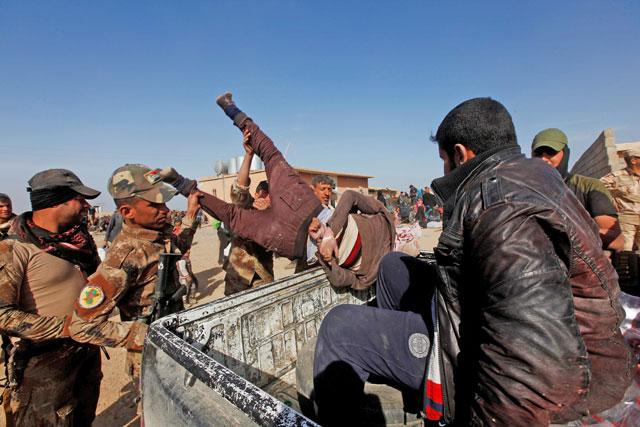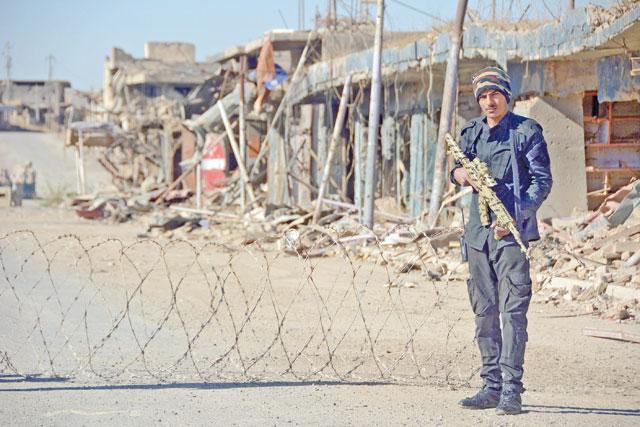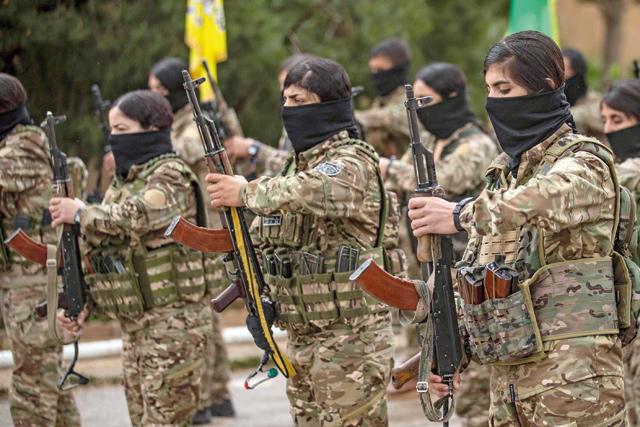You are here
Iraq accused of violating due process for Daesh suspects
By Reuters - Dec 05,2017 - Last updated at Dec 05,2017

Iraqi Special Operations Forces arrest a person suspected of belonging to Daesh militants in western Mosul, Iraq, on February 26 (Reuters photo)
BAGHDAD — Iraqi federal and Kurdish regional judiciaries are violating the rights of the Daesh extremist group suspects with flawed trials, arbitrary detentions under harsh conditions and broad prosecutions, Human Rights Watch (HRW) said on Tuesday.
As the militant group’s self-proclaimed “caliphate” crumbles following defeats in Iraq and Syria, thousands suspected of joining it have been captured, detained, and put on trial. At least 200 have been sentenced and at least 92 executed, an HRW report said.
Prime Minister Haider Al Abadi, at a weekly news conference on Tuesday, denied that Iraq puts Daesh suspects on trial without evidence but did not address other parts of the HRW report.
His government faces the task of exacting justice on Daesh members while preventing revenge attacks on people associated with the group that could only undermine efforts to create long-term stability.
New York-based HRW said that an 80-page report it released early on Tuesday “finds serious legal shortcomings that undermine efforts to bring [Daesh] fighters, members, and affiliates to justice”.
A spokesman for Iraq’s supreme judicial council, which supervises the federal judiciary, declined to comment on the contents of the report ahead of its release.
Issues highlighted by the HRW report:
- It is too easy to accuse someone of belonging to Daesh and have them detained. Wanted lists or community accusations without evidence can result in the detention of suspects for months even if wrongly accused.
- Detention centres are overcrowded and authorities fail to separate children from adult detainees. Iraqi law states detainees should be brought to a judge within 24 hours of capture but this does not happen.
- Detainees are often subject to torture, not granted access to lawyers, and their families are not informed of their whereabouts. Iraqi authorities say they have investigated these allegations but have not released any findings.
- The reliance of Iraqi and Kurdish courts on counter terrorism laws to prosecute suspects rather than on laws in the criminal code means crimes are not prioritised by gravity and victims are not included in the process as suspects are not tried for individual acts of murder, rape, torture or slavery.
- Proving guilt under counter-terrorism laws is easier as a judge only needs proof that a defendant was a member of Daesh to find them guilty. This means that anyone from cooks and doctors serving under the group to actual fighters is subject to the same sentences, which range from life in prison to death.
This stretches Iraq’s resources thin as casting such a wide net means the courts lack the time or manpower to go through all cases, the HRW report says, which prevents victims from getting personal justice.
HRW said that when it raised concerns about prosecutors not charging suspects with crimes under the criminal code, Iraqi judicial authorities said there was no need.
“Genocide and terrorism are the same crime, why would we need a separate charge for genocide?” the report quoted one counter-terrorism judge as saying.
Related Articles
BAGHDAD — An Iraqi security agency has admitted holding hundreds of "terrorism" suspects for months, Human Rights Watch (HRW) said on Sunday
NASIRIYAH, Iraq — Iraq hanged 38 extremists belonging to the Daesh terror group or Al Qaeda for terrorism offences on Thursday in the southe
AL OMAR, Syria — Daesh forces remain as dangerous today as when they were ousted from their last Syrian bastion two years ago, Kurdish forces warned on Tuesday as they marked the anniversary.

















